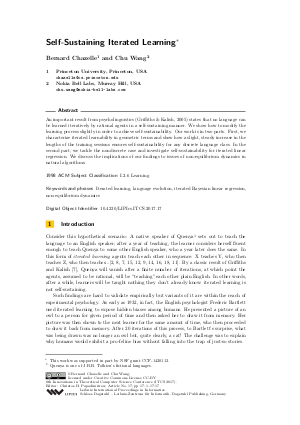Self-Sustaining Iterated Learning
Authors Bernard Chazelle, Chu Wang
-
Part of:
Volume:
8th Innovations in Theoretical Computer Science Conference (ITCS 2017)
Part of: Series: Leibniz International Proceedings in Informatics (LIPIcs)
Part of: Conference: Innovations in Theoretical Computer Science Conference (ITCS) - License:
 Creative Commons Attribution 3.0 Unported license
Creative Commons Attribution 3.0 Unported license
- Publication Date: 2017-11-28
File

PDF
LIPIcs.ITCS.2017.17.pdf
- Filesize: 0.72 MB
- 17 pages
Document Identifiers
Subject Classification
Keywords
- Iterated learning
- language evolution
- iterated Bayesian linear regression
- non-equilibrium dynamics
Metrics
- Access Statistics
-
Total Accesses (updated on a weekly basis)
0PDF Downloads0Metadata Views
Abstract
An important result from psycholinguistics (Griffiths & Kalish, 2005) states that no language can be learned iteratively by rational agents in a self-sustaining manner. We show how to modify the learning process slightly in order to achieve self-sustainability. Our work is in two parts. First, we characterize iterated learnability in geometric terms and show how a slight, steady increase in the lengths of the training sessions ensures self-sustainability for any discrete language class. In the second part, we tackle the nondiscrete case and investigate self-sustainability for iterated linear regression. We discuss the implications of our findings to issues of non-equilibrium dynamics in natural algorithms.
Cite As Get BibTex
Bernard Chazelle and Chu Wang. Self-Sustaining Iterated Learning. In 8th Innovations in Theoretical Computer Science Conference (ITCS 2017). Leibniz International Proceedings in Informatics (LIPIcs), Volume 67, pp. 17:1-17:17, Schloss Dagstuhl – Leibniz-Zentrum für Informatik (2017)
https://doi.org/10.4230/LIPIcs.ITCS.2017.17
BibTex
@InProceedings{chazelle_et_al:LIPIcs.ITCS.2017.17,
author = {Chazelle, Bernard and Wang, Chu},
title = {{Self-Sustaining Iterated Learning}},
booktitle = {8th Innovations in Theoretical Computer Science Conference (ITCS 2017)},
pages = {17:1--17:17},
series = {Leibniz International Proceedings in Informatics (LIPIcs)},
ISBN = {978-3-95977-029-3},
ISSN = {1868-8969},
year = {2017},
volume = {67},
editor = {Papadimitriou, Christos H.},
publisher = {Schloss Dagstuhl -- Leibniz-Zentrum f{\"u}r Informatik},
address = {Dagstuhl, Germany},
URL = {https://drops.dagstuhl.de/entities/document/10.4230/LIPIcs.ITCS.2017.17},
URN = {urn:nbn:de:0030-drops-81711},
doi = {10.4230/LIPIcs.ITCS.2017.17},
annote = {Keywords: Iterated learning, language evolution, iterated Bayesian linear regression, non-equilibrium dynamics}
}
Author Details
References
-
FC Bartlett. Remembering: a study in experimental and social psychology.(1932). 317 pp.

-
Aaron Beppu and Thomas L Griffiths. Iterated learning and the cultural ratchet. In Proceedings of the 31st annual conference of the cognitive science society, pages 2089-2094. Citeseer, 2009.

-
A Bhattachayya. On a measure of divergence between two statistical population defined by their population distributions. Bulletin Calcutta Mathematical Society, 35:99-109, 1943.

-
Dorin Comaniciu, Visvanathan Ramesh, and Peter Meer. Real-time tracking of non-rigid objects using mean shift. In Computer Vision and Pattern Recognition, 2000. Proceedings. IEEE Conference on, volume 2, pages 142-149. IEEE, 2000.

-
Kenneth R Davidson and Stanislaw J Szarek. Local operator theory, random matrices and banach spaces. Handbook of the geometry of Banach spaces, 1(317-366):131, 2001.

-
Alan Edelman. Eigenvalues and condition numbers of random matrices. SIAM Journal on Matrix Analysis and Applications, 9(4):543-560, 1988.

-
Thomas L Griffiths and Michael L Kalish. A bayesian view of language evolution by iterated learning. In Proceedings of the 27th annual conference of the cognitive science society, pages 827-832, 2005.

-
Thomas L Griffiths and Michael L Kalish. Language evolution by iterated learning with bayesian agents. Cognitive Science, 31(3):441-480, 2007.

-
Thomas L Griffiths, Michael L Kalish, and Stephan Lewandowsky. Theoretical and empirical evidence for the impact of inductive biases on cultural evolution. Philosophical Transactions of the Royal Society of London B: Biological Sciences, 363(1509):3503-3514, 2008.

-
Michiel Hazewinkel. Encyclopaedia of Mathematics. Springer Science &Business Media, 2013.

-
Michael L Kalish, Thomas L Griffiths, and Stephan Lewandowsky. Iterated learning: Intergenerational knowledge transmission reveals inductive biases. Psychonomic Bulletin &Review, 14(2):288-294, 2007.

-
Simon Kirby, Tom Griffiths, and Kenny Smith. Iterated learning and the evolution of language. Current opinion in neurobiology, 28:108-114, 2014.

-
James R Norris. Markov chains. Cambridge university press, 1998.

-
Amy Perfors and Daniel Navarro. Language evolution is shaped by the structure of the world: An iterated learning analysis. In Annual Conference, 2011.

-
Anna N Rafferty, Thomas L Griffiths, and Dan Klein. Convergence bounds for language evolution by iterated learning. In Proceedings of the Thirty-First Annual Conference of the Cognitive Science Society, 2009.

-
Anna N Rafferty, Thomas L Griffiths, and Dan Klein. Analyzing the rate at which languages lose the influence of a common ancestor. Cognitive science, 38(7):1406-1431, 2014.

-
Mark Rudelson and Roman Vershynin. Smallest singular value of a random rectangular matrix. Communications on Pure and Applied Mathematics, 62(12):1707-1739, 2009.

-
Kenny Smith. Iterated learning in populations of bayesian agents. In Proceedings of the 31st annual conference of the cognitive science society, pages 697-702. Citeseer, 2009.

-
Mónica Tamariz and Simon Kirby. Culture: copying, compression, and conventionality. Cognitive science, 39(1):171-183, 2015.

